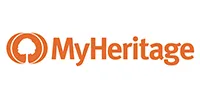Which DNA testing service is right for you?
Tracing your family's lineage starts with choosing the right genetic testing company. In this review, we've compared two of the biggest DNA testing brands side by side. We've put MyHeritage and AncestryDNA to the test and compared their key features.
Want to know which one is the best fit for your needs? Scroll on to learn more.
A quick review: AncestryDNA and MyHeritage
 MyHeritage |  AncestryDNA | |
| Description | Explore your ethnic heritage and discover long-lost relatives with the help of this hassle-free DNA test. | Learn about your family's health and origins with over 1,100 regions analysed. |
| DNA collection type | Cheek swab | Saliva |
| Test type | Autosomal | Autosomal |
| Result in | 3-4 weeks | 6-8 weeks |
| Price per kit | From $89 (plus shipping) | From $129 + shipping |
| Database size | 6.1 million | 20 million |
| DNA matching? | Yes | Yes |
| Genetic traits report? | Yes | Yes |
| Ancestry reports | Yes | Yes |
| Geographic regions | 2,100 + | 1,500 + |
| Downloadable raw data? | Yes | Yes |
| Family tree software | Yes | Yes |
Collection method
AncestryDNA provides clients with a test tube to collect their saliva for DNA processing. This makes collecting your DNA simple. Simply spit into the test tube (up to the black line), ensure the cap is secure, shake the tube for 5 seconds and then ship it back to the company. AncestryDNA will also provide you with a prepaid envelope for returning your sample to its labs.
MyHeritage requires you to collect DNA samples using a cheek swab. This takes about 30-60 seconds. Once you've collected the sample, pop the swab into the provided vial, snap the stick of the swab off and close. Repeat the process with a second swab and vial, then ship the samples back to MyHeritage for testing. You will need to return your samples to the MyHeritage laboratories at your own cost.
Testing
Both AncestryDNA and MyHeritage test autosomal DNA, which covers the maternal and paternal lineage of a person. This type of testing is the quickest and the most common type of testing offered by DNA testing service providers. It can reveal information about which part of the world your ancestors originated from and tell you about individual ancestors up to 6 or 7 generations back.
Ethnic regions
AncestryDNA covers over 1,500 regions globally. The company compares your DNA to the DNA of people with known origins from around the world. AncestryDNA has collected more than 20 million DNA samples. It has even updated its ethnicity estimate reference panel recently too. So, customers will now have the ability to see a possible genetic connection with the Indigenous Australian community.
MyHeritage has a database for the Ethnicity Estimate feature that covers 42 ethnicities. This database helps pinpoint a person's ethnicity even if their ancestors migrated from another country. Additionally, the Genetic Groups feature covers more than 2,100 geographic regions offering insights into your ancestors' past geographic locations and migration patterns.
Processing speed
Once your sample arrives at the lab, MyHeritage takes approximately 3 to 4 weeks to process your sample.
In contrast, AncestryDNA takes about 6 to 8 weeks. After your processing is completed, simply log on to the specific web portal to view the report. AncestryDNA will email you a notification when your information is prepared and ready to be viewed.
Price
AncestryDNA's kit is $129, plus an additional cost for shipping. Premium memberships start from $21.99 a month and give you access to records across different regions as well as a chance to connect with other Ancestry members. You can also access death, marriage, birth, military and church records.
MyHeritage offers its DNA testing kits for $139 excluding shipping charges. You can also choose to subscribe to the Complete Plan, which gives you access to a number of premium features. These include an unlimited family tree size, full search access to more than 16.8 billion historical records, the ability to colourize black and white photos and priority email support.
Privacy and security
AncestryDNA identifies the samples with a specific code to process your DNA. Results are stored in a secured database that is encrypted to keep the information secure. If you agree to AncestryDNA's Informed Consent for Research, the company will store your sample for future research. You do have the option to get in touch with Member Services and request to have your sample destroyed.
Your profile on MyHeritage has privacy settings that you can change if you do not wish to have your DNA matched and want to prevent others from viewing and downloading your shared segments' details. You will need to sign an informed consent form if you wish to volunteer your DNA results for the research. You also have the option to have your sample destroyed.
Both companies state that they will never sell your DNA sample and results or your health information to any third parties without your explicit informed consent.
Verdict
Both AncestryDNA and MyHeritage are suitable for people who are looking to dig deep into their ancestry.
While both companies offer relatively similar features, AncestryDNA has a more extensive database, making it the ideal choice if you want intensive genealogical research and to connect with as many relatives as possible.
If you're hoping to test the waters and would prefer a quicker turnaround, MyHeritage may suit you better. MyHeritage also covers a wider reach of geographic regions, which could prove more helpful in accurately tracing the migration patterns of your ancestors.
All in all, both AncestryDNA and MyHeritage should be able to provide the insights you are after.
Compare more DNA test kits
Frequently asked questions
Can I take an autosomal DNA test if I'm biologically a woman?
Autosomal DNA tests trace a person's autosomal chromosomes. The autosomal chromosomes contain the DNA segments a person shares with everyone to whom they're related. Autosomal DNA tests are accessible to all, regardless of their biological sex.
How do I prepare for a DNA test?
For saliva samples collected using a test tube, you should first brush your teeth or use mouthwash. It helps to gently rub your cheeks from the outside to encourage saliva production, before spitting into the tube. For both saliva and cheek swab samples, do not eat, drink, smoke, or chew gum or tobacco for at least 30 minutes before providing a sample.
Back to topMore guides on Finder Shopping
-
Where to buy mitochondrial DNA tests in Australia 2025
Explore a list of reliable retailers that offer mtDNA testing options to help you learn more about your maternal ancestry.
-
Where to buy DNA tests for dogs 2025
Explore a list of reliable retailers that offer DNA testing for dogs to ensure you have access to all the need-to-know info on your canine companion.
-
23andMe vs AncestryDNA
Compare the key features of 23andMe and AncestryDNA and settle on the right kit for your needs.
-
Living DNA Review
Compare four Living DNA test kits, including their key features and costs in our guide.
-
23andMe review
23andMe is a DNA testing kit that helps you understand your ethnicity, pinpoint medical risks and find distant relatives.
-
MyHeritage Review
What you need to know about MyHeritage's no-frills DNA kits, which offer competitively-priced tests and fast results.
-
AncestryDNA Review
Whether you're looking to find a long-lost relative or just learn about your family's past, AncestryDNA could meet your needs.